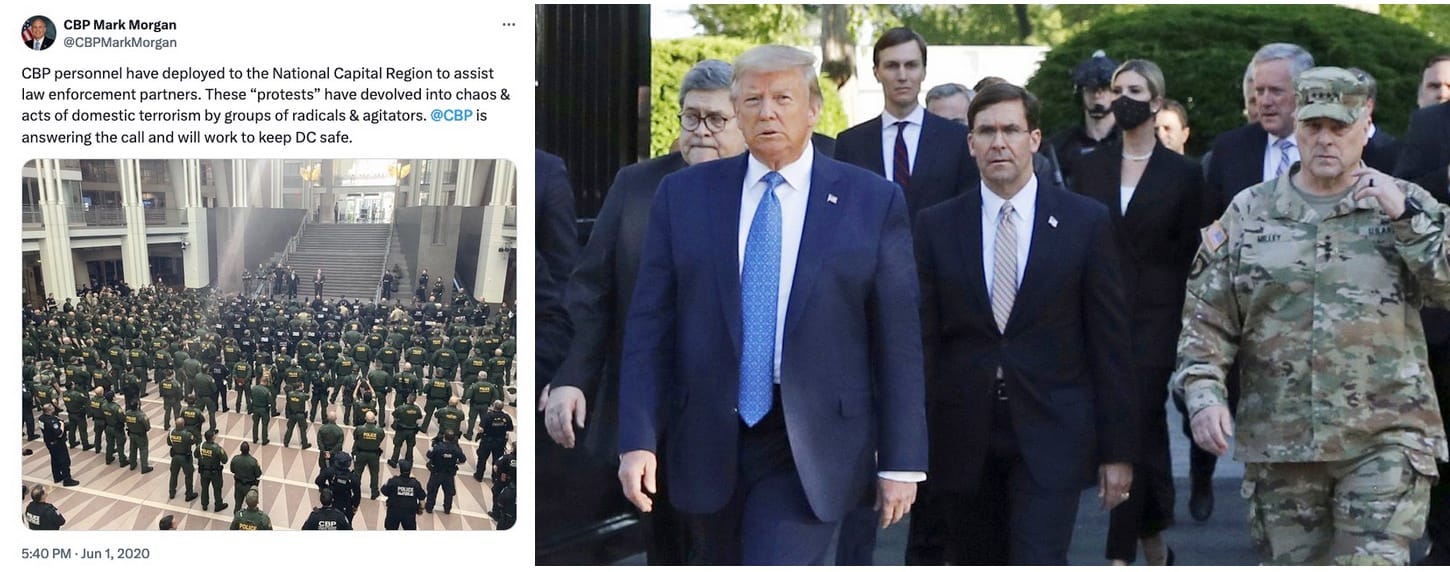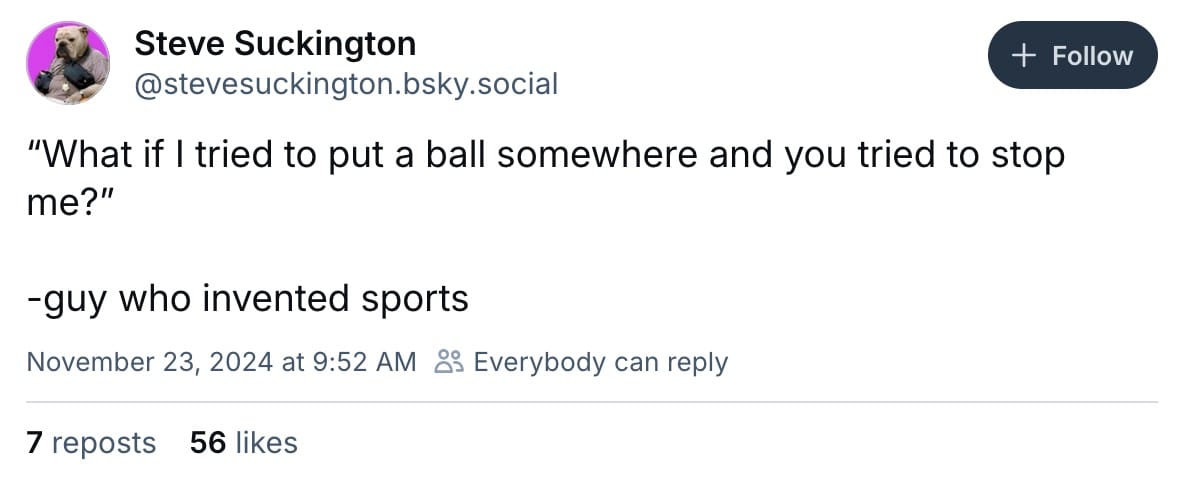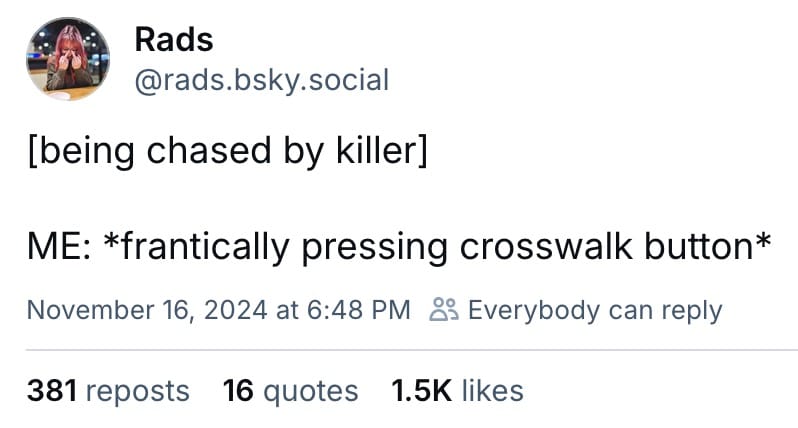Updates from Adam Isacson (November 23, 2024)
Hi, this is Adam. If you're receiving this message, it means you signed up on my website to receive regular updates. If you'd like to stop getting these, just follow the instructions further down.
Work has been busy in this post-election environment. I count 41 meetings and interviews on my calendar over the past two weeks, along with the usual writing deadlines like the weekly Border Updates. It makes it a challenge to do the "researching and generating content" part of the job, but it's been a pleasure and a balm to be around people who do this work in the days since November 5.
This week's Border Update (summary below, full text here) is worth at least some of your time. It's an important moment to be "doing the reading" about what awaits us in the next administration, and I did a lot of it last week, tying it up as concisely as I could (not very). This edition is getting giant download numbers on our website, and some encouraging feedback from readers (thanks, it means a lot).
I probably will not post an e-mail next weekend: I'm off work for three days, for the U.S. Thanksgiving holiday and a big milestone birthday for a close relative. There won't be a weekly border update, either. So I'll most likely see you in two weeks.
Weekly U.S.-Mexico Border Update: “mass deportation,” the impact on Mexico, October migration data
THIS WEEK IN BRIEF:
Two and a half weeks after Election Day, little has emerged about the scope or process of the incoming Trump administration’s plans for “mass deportation.” Plans remain vague, while many immigrant rights defenders fear the worst. This narrative includes a discussion of a possible domestic military deployment to support deportation and three laws that might authorize it.
Mexico may find tens of thousands of in-transit migrants stranded in its territory when a U.S. administration takes office with plans to deport many more, including some from other countries. Migrants, some participating in short-lived “caravans,” worry about what might happen to them after January 20, while Mexican government officials say that they are not concerned about relations with the United States.
Border Patrol apprehended 56,530 migrants at the U.S.-Mexico border in October 2024, a number very similar to July through September and one of the lowest since the last months of the previous Trump administration. Arrivals of Central American families are increasing. Weekly data show a decrease in migrant arrivals following Election Day in the United States: while a pre-inauguration rush to U.S. soil is likely, it has not begun yet. Migration through the Darién Gap is reduced, at least partially because of weather conditions.
Here, from the text, is a rendering of CBP's "encounters" with migrants at the U.S.-Mexico border by nationality over the past 49 months. Note the consistency of the last 4 months since the Biden administration cut off most access to asylum:

Support ad-free, paywall-free Weekly Border Updates. Your donation to WOLA is crucial to sustain this effort. Please contribute now and support our work.
Listen to Human Rights Defenders

From "chief aid recipient" to "designated for gross human rights violations": that’s quite a turnabout for Colombian Army Gen. Mario Montoya. In the early years of the “Plan Colombia” security buildup, Montoya was the “can-do” general whom the U.S. and Colombian governments frequently featured when they gave reporters access to military operations supported by big U.S. aid packages starting in 2000.
We now know that Montoya had a darker side of collusion with death squads, tacit backing of right-wing paramilitary groups, and—later, as Army commander—overseeing a spike in murders of civilians through relentless encouragement of high body counts. The State Department sanctions announced today further confirm this.
None of this is news to Colombia’s human rights defenders, who had been warning about Montoya’s record, and the rising number of extrajudicial killings, for years before either government began to respond.
This is yet another reminder of the importance of listening to human rights defenders.
Links From the Past Week
- Maria Celeste Maradiaga, Hidroelectrica Construida Irregularmente en Tierras de la Reforma Agraria Amenaza a Comunidad Indigena en Honduras (ContraCorriente (Honduras), Monday, November 18, 2024).
The Puringla-Sazagua hydroelectric project in La Paz, Honduras combines many of the country's ills: systemic land theft, environmental degradation, violations of Indigenous communities’ rights, corporate greed. and government complicity.
- Brazil: Public (in)Security Experiences in Sao Paulo and Rio de Janeiro (Inter-American Dialogue, Monday, November 18, 2024).
A data-filled brief analyzing public policies to address insecurity in São Paulo and Rio de Janeiro.
- Chris Mirasola, How Can Trump Deploy the Military at the Southern Border? (University of Houston Law Center, Lawfare, Tuesday, November 19, 2024).
I referred to this piece heavily when I wrote about authorities that Trump might be able to use to send U.S. military personnel out to carry out "mass deportations" and other missions on U.S. soil. A very clear explanation.
- S. C. Cornell, Death in Nogales (The New York Review of Books, Saturday, November 16, 2024).
The killing of Gabriel Cuen Buitimea, a Mexican migrant, on an Arizona ranch combines militarized U.S.-Mexico border enforcement, vigilante culture, expectations of impunity, and other factors that incentivize violence against migrants.
- Dirlyn Gonzalez, Hedy Quino, Ixmucane Us Ixtabalan, Jose Agripino Sian, Mayra Zapeta, ¿Que Ejercito Quiere el Comandante en Jefe Bernardo Arevalo? (Agencia Ocote (Guatemala), Friday, November 15, 2024).
Guatemalan President Bernardo Arévalo's efforts to reform and oversee the military—focusing on democratization, transparency, and gender equality—face deep resistance both within the institution and on the country's powerful right wing.
Interview with Colombia's Blu Radio
Here, in Spanish, is a November 21 interview with one of Colombia's principal radio networks: "¿Qué implicaciones podría tener para Latinoamérica el regreso de Donald Trump a la Casa Blanca?"
I didn't realize that the interview would have a video component, so I'm underdressed and there's a dirty blue dishrag on the left (our washer-dryer is behind the door). Good conversation, though.
I also spoke last week to the BBC, the New York Times, Drop Site News, and La Silla Vacía.
Organized Crime-Tied Corruption in the Americas: Links from the Past Month
(Posted Saturday, November 23)
Over the past month, I managed to add 69 stories with the tag “Organized Crime” to my database of Latin American security-related news and reports.
Breaking deep, corrupt links and collusion between governments and criminal organizations must be at the core of any strategy to weaken organized crime and make people feel safer. Despite that, of the 69 articles, just 12 (7 from Mexico alone) documented examples of official collusion with organized crime. They are linked below.
Chile
- Philip Sanders, Valentina Fuentes, “Killings and Prison Torture Raise Alarms Over Gang Crime in Chile” (Bloomberg, Yahoo, October 30, 2024).
As Chile arrests more gang members, the race is on to stop the prison system from becoming a new command nucleus for organized crime. Preventing corruption is going to be a key part of that effort.
“Criminal organization and state corruption are two sides of the same coin,” said Fernando Guzman, a judge who has made regular visits to Santiago I. “It is impossible to build a powerful criminal enterprise, with significant profitability, without an alliance with some state agencies.”
There have been some isolated cases of corruption among the police force and prison guards.
Colombia
- “Jep Pasa a Fiscalia Investigaciones de Agentes del Estado Mencionados por Otoniel” (El Espectador (Colombia), October 23, 2024).
The Special Jurisdiction for Peace (JEP) has forwarded copies of investigations to the Prosecutor’s Office, the Supreme Court of Justice and Case 08 of the same JEP so that the respective judicial processes can be carried out against a major general of the Army, six State agents and three civilians, accused by Dairo Antonio Úsuga David, alias ‘Otoniel’, for their alleged collaboration with paramilitary groups.
Among those investigated by the JEP is Major General Carlos Omairo Lemus Pedraza, who was commander of the XVIII Brigade of the National Army between 2000 and 2003. According to the testimony of the former paramilitary chief, Lemus allegedly collaborated with the paramilitaries, allowing the expansion of these groups in the Arauca region. Alongside him are several former governors and officials such as Julio Acosta Bernal, former governor of Arauca, and Helí Cala López, former governor in charge of Casanare, who allegedly facilitated the presence and operation of the paramilitaries in their respective regions.
Other prominent names include Óscar Raúl Iván Flórez Chávez, former governor of Casanare, and Milton Rodríguez Sarmiento, former senator, both accused of alleged participation in the consolidation of paramilitary control in Casanare and their support for the AUC. Also mentioned are businessmen such as Andrés Rueda Gómez, former secretary of infrastructure of Casanare, and Sergio Hernández Gamarra, former rector of the University of Cartagena, who allegedly collaborated financially with the AUC in contracts that favored these groups.
… The collaboration of these state actors with the paramilitaries not only allowed these groups to increase their power in the regions of Casanare and Arauca, but also consolidated territorial control that led to multiple human rights violations. In Casanare, for example, political and business actors facilitated contracts and resources that financed the operations of the Centauros Bloc, while in Arauca, the AUC, with the backing of local authorities and members of the security forces, managed to consolidate their dominance to combat other insurgent groups and control the region.
Haiti
- Evens Sanon, Pierre-Richard Luxama, “Gang Coalition in Haiti Spreads Violence to Port-Au-Prince Neighborhood, Setting Fire to Homes” (Associated Press, Associated Press, October 26, 2024).
In Solino, Garry Jean-Joseph, 33, blamed the police for the ongoing violence. “I left with nothing,” he said. “The people of Solino do not understand last night, the conspiracy of the policemen and the Live Together (Viv Ansanm) soldiers.”
The resident described how at 2 a.m., a policeman in an armored car told residents to go home and that they would secure the neighborhood. However, shortly afterward residents could hear gangs invading. “The police delivered Solino,” he added.
Some officers with Haiti’s National Police have been long accused of corruption and working with gangs.
Mexico
- Abel Barrera Hernandez, “Guerrero, en el Abismo de la Muerte” (La Jornada (Mexico), November 21, 2024).
Germán Reyes Reyes, the retired military officer accused of ordering the assassination of Chilpancingo municipal president Alejandro Arcos, served as a prosecutor for serious crimes from 2022 to 2024. In the new municipal administration, he was placed in charge of the Public Security Secretariat. His career in the state capital was cut short on November 12, when he was arrested by the National Guard and the Army. In the initial hearing, the Public Prosecutor accused the official of being part of the criminal group Los Ardillos. The judge evaluated the evidence and ordered preventive detention.
The following day the Army issued a communiqué distancing itself from the accused; however, it had endorsed his appointment as prosecutor when Lieutenant Sandra Luz Valdovinos was appointed attorney general. So far in Evelyn Salgado Pineda’s administration, the investigation of the crimes is in the hands of the Army. The results have been disastrous because most of the investigation files are not prosecuted, and high-impact crimes have increased in the state’s eight regions.
- Alejandro Almazan, “Cronica Desde Culiacan, la Ciudad Tomada por el ‘Narco’” (Milenio (Mexico), November 17, 2024).
While the kidnapping of [top Sinaloa cartel leader Ismael “El Mayo”] Zambada has broken the order that existed around drug trafficking in Sinaloa, little is said about the conflict between Governor Rocha [Rubén Rocha Moya] and former university president [Héctor] Cuén, the genesis of the de facto state of emergency in Culiacán.
… Then comes 2021. Cuén, more astute than Rocha, sold Morena on the need for an alliance with PAS [a local political party] and agreed that Rocha would be the gubernatorial candidate in exchange for him being appointed Secretary of Government or Senator. Several local media published that the elections had been won with the help of Zambada and the Guzmans, who threaten opposition politicians and move people around. Once the governorship was pocketed, Rocha offered him the Secretary of Health.
- Emiliano Rodriguez Mega, James Wagner, “Mexican Officials Arrest Top Security Official in Mayor’s Beheading” (The New York Times, November 13, 2024).
The newly elected mayor of Chilpancingo, Mexico, had appointed Germán Reyes as the man who would safeguard his city.
But on Tuesday, the Mexican authorities arrested Mr. Reyes, a retired military officer and former prosecutor, accusing him of ordering the mayor’s brutal killing in southwest Mexico last month in a case that had already shocked a nation reeling from widespread violence against local politicians.
…State prosecutors on Tuesday announced the arrest of Mr. Reyes, 46, the city’s security chief, on a charge of aggravated homicide, saying he colluded with a local criminal group to abduct and assassinate the mayor.
- “After Mayor Beheaded in Mexico, a Former Prosecutor Is Arrested in Connection With the Murder” (CBS News, November 13, 2024).
The implication was that Reyes – who was also a former military officer who, according to his official resume, retired with rank of captain in the military justice system – had somehow worked in collusion with the gang.
That would suggest that at least one of the two warring gangs fighting for control of Chilpancingo controls, intimidates or works with officials there.
If Reyes is convicted, it would also be a stinging rebuke for a policy adopted by cities across Mexico of hiring retired military officers for top local police jobs, on the assumption that they are less prone to corruption.
It was also revealing that state detectives had to rely on federal forces—soldiers and the National Guard—to make the arrest, suggesting they may not have trusted state and local police who would normally carry out such tasks.
- Emily Green, “Held for Ransom in Animal Pens, Migrants Face Mass Kidnappings as U.S. and Mexico Ramp Up Enforcement” (ProPublica, November 1, 2024).
Heyman Vázquez, a Catholic priest who works in Ciudad Hidalgo, along the Guatemalan border, said criminal groups in southern Mexico have gone so far as to set up checkpoints along the main highway in an effort to identify migrants. “The authorities are involved,” he said about the kidnappings, adding that there’s a blurry line between the authorities charged with protecting migrants and the cartels exploiting them. “You never know who you’re talking to,” he said.
The Mexican government didn’t respond to requests for comment on allegations that organized crime has set up checkpoints along the highway in southern Mexico or that kidnappers may be collaborating with officials.
- Maria Verza, “How Mexican Cartels Manage the Flow of Migrants on Their Way to the Us Border” (Associated Press, Associated Press, October 30, 2024).
Ciudad Hidalgo Mayor Elmer Vázquez claimed to not know anything about migrant safe houses operating in the area and said his town always looks after migrants.
But Rev. Vázquez (no relation to the mayor), who has spent two decades defending migrants, said the prosecutor’s office, National Guard, special prosecutor for crimes against migrants do nothing even when crimes are reported.
“They are colluding with organized crime and, of course, they make it look like they’re doing their jobs,” he said.
- Anel Tello, “Policias Asesinados en Mexico: El Reflejo de un Crisis de Seguridad” (Milenio (Mexico), October 24, 2024).
In the specific case of Guanajuato, the attacks against police officers have been concentrated in the Laja – Bajío area, which is under the control of the Jalisco Cartel – New Generation (CJNG) and is disputed by the Santa Rosa de Lima Cartel (CSRL).
In an interview with MILENIO, public security consultant David Saucedo said that in the region, also known as the Huachicol Triangle, it is the criminal organization founded by José Antonio Yépez Ortiz – alias El Marro- that is fighting public security corporations.
According to documents from the National Defense Secretariat (Sedena) leaked by Guacamaya Leaks and cited by the consultant, the Santa Rosa de Lima Cartel had managed to infiltrate municipal and state security agencies and even the National Guard, from whom they received protection and support to escort tanks of stolen fuel leaving the Salamanca refinery.
With the CJNG’s violent incursion into Guanajuato municipalities and the so-called Industrial Corridor, the criminal organization currently headed by members of El Marro’s family has taken on the task of attacking security corporations that are not aligned with them.
“The Santa Rosa Cartel does control some municipal police in the state of Guanajuato but others do not. Others are out of their control and that is where they have launched a combat strategy, especially in Celaya which is their economic capital and where they carry out kidnapping, extortion, fuel theft and above all drug dealing activities,” explained David Saucedo in an interview with MILENIO.
Thus, the attacks on police officers that have been reported during 2024 in Celaya would be related to the Santa Rosa de Lima Cartel since, in the consultant’s words, “it is one of the few police forces in Guanajuato that does carry out this activity of combating organized crime”.
To combat security corporations, the criminal organization headed by José Antonio Yépez Ortiz has assigned deserters from the Colombian Army, as well as members of the Grupo Escorpión of the Gulf Cartel with whom they created alliances to stop the advance of the CJNG.
(For more about ex-Colombian military personnel working with cartels in Guanajuato, Mexico, see this May 2023 report at Mexico’s El Universal from Héctor De Mauleón.)
Peru
- Wilber Huacasi, “Leyes a Favor del Crimen Organizado y la Corrupcion del Congreso Son Reportadas Ante la Cidh” (La Republica (Peru), November 14, 2024).
In a hearing held this afternoon before the Inter-American Commission on Human Rights (IACHR), Peruvian judge and member of the Latin American Federation of Magistrates Oswaldo Ordóñez alerted the international community about the permanent political attacks against the Public Prosecutor’s Office and the Judiciary, and made a report on all the laws in favor of organized crime and corruption approved so far by the Peruvian Congress.
… The magistrate recounted all the laws approved so far in Peru in favor of organized crime and corruption by the Congress dominated by Fuerza Popular, Peru Libre, and APP, together with other satellite blocs.
“This parliamentary majority and the Executive Power have enacted laws that modify the statute of limitations; that cut the terms in the processes of effective collaboration; that prevent the seizure of goods or materials used in illegal mining; that exclude all political parties from any criminal responsibility; that promote impunity for terrorists and ex-military; that oblige raids to be carried out with the presence of the raided person’s lawyer, and establish a new typification of the crime of organized crime”, he commented.
The magistrate commented that this new regulatory framework “has generated the exponential growth of crime and insecurity, putting the entire population at serious risk”.
Venezuela
- Mie Hoejris Dahl, “As Venezuela’s Crisis Rolls on, Its Wildlife Is Increasingly at Risk” (Mongabay, November 7, 2024).
Environmental leaders and activists agree that improving the situation for Venezuelan wildlife requires a fundamental shift in the government’s modus operandi. The government must cut ties with wildlife traffickers and actively prosecute cases of trafficking.
Cristina Burelli, founder of conservation NGO SOS Orinoco, says a lack of institutions and rule of law create favorable conditions for wildlife trafficking in Venezuela. “The only way to combat wildlife trafficking is by strengthening institutions, but that’s not going to happen under the Maduro regime. So unfortunately, until there’s a change of government, I don’t think there’s going to be any change [for wildlife],” she says.
“It has created a situation in Venezuela where nobody really cares,” she adds.
Picking Up Where They Left Off
(Posted Wednesday, November 20)

Things had been chaotic since January 2017, but Donald Trump’s first administration took a sharply darker turn during and after the June 2020 George Floyd / Black Lives Matter protests, all the way to the January 6 Capitol riots.
The Department of Homeland Security had already been captured by Trump loyalists who specifically sought to deter migration through cruelty, most notably during the 2017-2018 family separation crisis. Then, as people took to the streets to protest police killings of Black Americans, the Trump White House sought to involve the U.S. armed forces in internal, politicized missions with few modern historical precedents.
Mercifully, the story ended there: Trump lost the elections five months later, and was dislodged two months after that.
Those very rough seven months were the endpoint of the last Trump administration. But they are the starting point of the next one. The danger, especially for U.S. civil-military relations, is hard to understate.
It was during those last seven and a half months of Trump’s term that the guardrails came down and destructive people gained positions of real power. The generals who had served as brakes on Trump’s wildest urges—McMaster, Mattis, Kelly—were long gone, and Trump was musing about having soldiers shoot protesters in the legs. Things got so bad by the end that the chairman of the Joint Chiefs of Staff took it upon himself to call his Chinese counterparts to reassure them that nothing destructively reckless was about to happen.
- Soldiers got sent out to clear protesters from part of Lafayette Square, by the White House, so that Trump could have his photo taken with a Bible. Joint Chiefs Chairman Gen. Mark Milley later apologized for accompanying Trump on that stunt.
- Acting DHS officials deployed Border Patrol agents and other federal law enforcement officers to the streets of interior cities like Washington and Portland to confront protesters. In Portland, the confrontations were frequent and violent.
- Little-known Trump loyalists like Ezra Cohen and Kash Patel, keeping close watch on acting Defense Secretary Chris Miller, gained effective control of the Pentagon.
- Nobody called out the National Guard in time to respond to the January 6 insurrection.
Nearly all of the president-elect’s appointments since Election Day make clear that he wants to pick up exactly where he left off during those final, terrible months.
The United States might scrape by as a democratic republic after four years like January 2017-May 2020. But four years like June 2020-January 2021? That would be extinction-level.
We need institutions to guard against that, if they’re even able. Especially the U.S. armed forces, which have a long tradition of resisting any alignment with a political party or leader. But it’s a tradition: the president is the commander in chief, and though it may take a couple of years to pack the high command with pro-MAGA generals and colonels, it’s not impossible to politicize them.
The road to politicization starts with calls to involve the armed forces in a partisan, almost certainly abusive domestic mass-deportation campaign, even if just in a logistical or supporting role. The road to military politicization will become an expressway if headlines like these become more than just notions: “Trump draft executive order would set up board to oust generals en masse”; “Trump transition team compiling list of current and former U.S. military officers for possible courts-martial.”
Latin America-Related Events in Washington and Online This Week
I don't see any this week, which is punctuated by a major U.S. holiday on Thursday. Happy Thanksgiving to U.S. readers. Non-U.S. readers: happy Thursday.
And Finally




